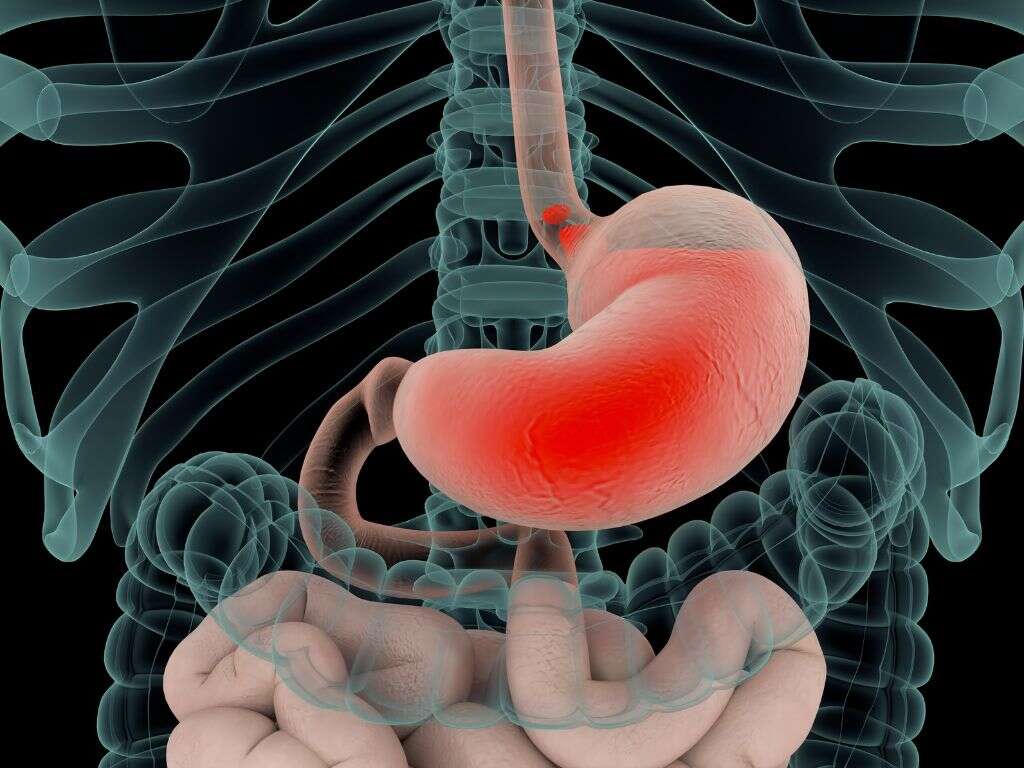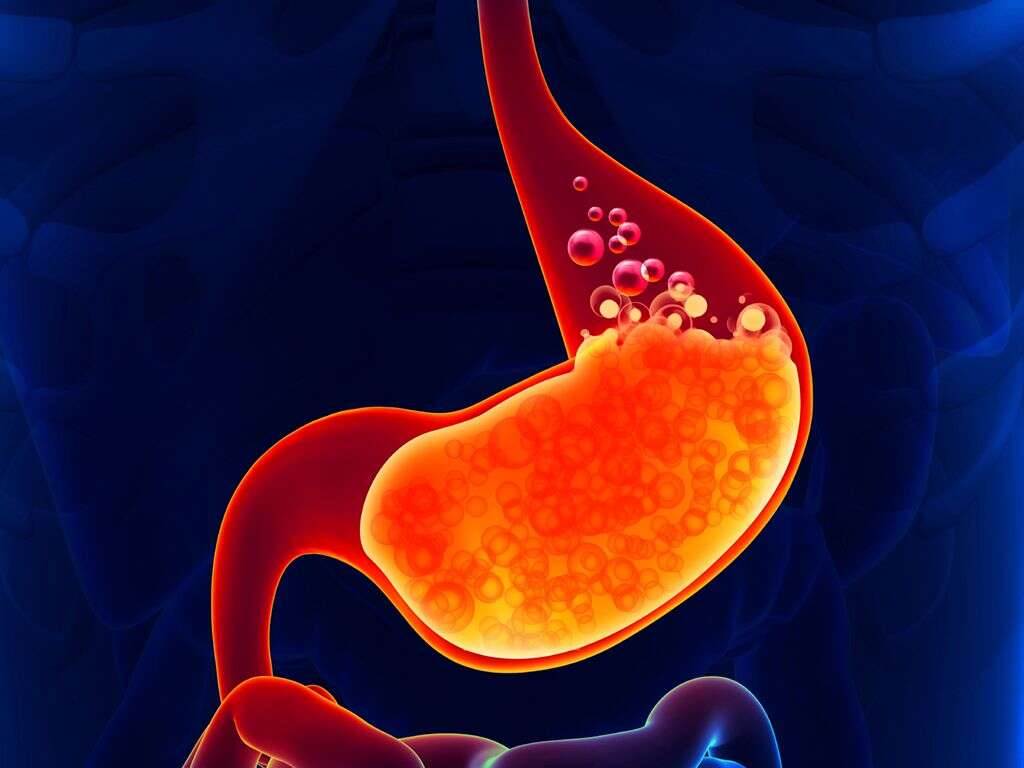What Is Acid Reflux?
If you have chronic indigestion accompanied by a burning sensation in the chest and an acidic taste in the mouth, you could be suffering from acid reflux. This common condition affects millions of people every year and can cause distracting symptoms that can impact all areas of life.
Common heartburn is usually triggered by food and lasts only a short time, but long-term acid reflux has the potential to cause damage to the esophagus and throat. If you think your chronic indigestion has crossed into acid reflux disease, here are 10 things you can learn about this common but painful medical condition.

1. What Is Acid Reflux?
When you swallow food or beverages, the lower esophageal sphincter (LES) that connects your esophagus to your stomach temporarily opens to allow passage. In normal cases, the LES immediately closes to prevent any reverse movement. Sometimes the LES does not close completely or opens when it shouldn’t, allowing acid from your stomach to come up into your esophagus. This movement is called acid reflux.
If acid reflux only occurs occasionally, the symptoms usually go away quickly without treatment. When acid reflux continues over time, it can develop into acid reflux disease. Treatment may be recommended for those suffering from chronic acid reflux or experiencing uncomfortable symptoms.

2. What Are the Symptoms?
Acid reflux presents with different symptoms depending on the severity and the cause. Mild acid reflux produces symptoms similar to heartburn, including a burning sensation in the abdomen, chest or throat and a bitter taste of acid in the throat or mouth. Chronic acid reflux can lead to acid reflux disease, which can have different or more severe symptoms. Nausea, bloating and burping are common, along with a dry cough and sore throat.
Some people suffering from acid reflux disease develop dysphagia, which is a term that means difficulty swallowing. Acid can travel up the esophagus and into the mouth or nasal passages in reflux cases that have progressed. Severe symptoms of acid reflux are sometimes confused with heart conditions, resulting in visits to the emergency room and added stress.

3. What Causes Acid Reflux?
Gastrointestinal reflux issues stem from several different issues in the body. Sometimes, the issues are anatomical. When the LES and the upper portion of your stomach move out of place and push above the diaphragm, a condition called a hiatal hernia occurs. A hiatal hernia can impede the normal functioning of the LES and allow acid to move up into the esophagus. Being overweight or pregnant can also cause anatomical issues leading to reflux due to restricted room around the gastrointestinal tract.
Some behaviors can lead to reflux disease, including overeating, lying down after meals, eating before going to bed for the night and smoking. Certain foods and beverages can be acid triggers for some people, particularly citrus fruits, tomatoes, onions, garlic, spicy foods, fatty foods, alcohol, coffee and carbonated drinks.

4. Can Acid Reflux Be Treated at Home?
Mild cases of acid reflux may not need treatment at all since they resolve after the triggering food has been digested. Before visiting the doctor, many people choose to treat their reflux at home using over-the-counter medications or natural remedies. Eliminating foods and beverages that cause symptoms is an easy way to treat reflux at home. Losing weight and stopping smoking are both lifestyle changes that can impact symptoms.
If you notice your symptoms worsen when you eat large meals, you can eat smaller, more frequent meals instead. Eat your final meal several hours before bed and remain upright to aid in digestion. At night or when lying down, you can prop yourself up by raising one end of your bed or using a wedge pillow. If modifications do not work, an over-the-counter antacid or acid-reducing medication may help.

5. Is Acid Reflux Dangerous?
Acute episodes of acid reflux are uncomfortable but usually not harmful. When the condition becomes chronic and is left untreated, it can lead to other medical conditions that are more concerning. One possible complication is an esophageal stricture. An esophageal stricture occurs when the esophagus becomes narrow, making it difficult to swallow. Another potentially dangerous condition is called Barrett’s Esophagus. This occurs when the cells within the esophagus mutate and can be a precursor to cancer of the esophagus, though this type of cancer is rare.
Some people experience reflux that travels into the mouth or nasal passages and in rare cases this can be inhaled, causing aspiration into the lungs and an elevated risk of aspiration pneumonia. Even without the most severe complications, chronic reflux can cause diarrhea, fatigue, persistent cough, weakness and a loss of appetite, all of which can affect your quality of life.

6. When Should You See a Doctor?
Not all acid reflux cases require a visit to the doctor. If you only experience a few cases of reflux a year and are able to treat it with at-home remedies such as antacids or acid reducers, you can probably wait until your next annual physical to bring up your concerns. If you find yourself frequently taking medicine or suffering from symptoms a special appointment may be necessary. Symptoms that do not respond to over-the-counter or at-home remedies should also be disclosed to your doctor.
As a general rule, if you are experiencing symptoms more than twice a week, are not responding to first-line treatment or are experiencing severe symptoms that are affecting your quality of life, you should schedule an appointment as soon as possible to begin a treatment plan. Your regular doctor may choose to refer you to a Gastroenterology for diagnosis since some of the diagnostic tools involve specialized training.

7. How Is Acid Reflux Disease Diagnosed?
Diagnosis for gastrointestinal reflux disease involves several methods, and you may not need every diagnostic procedure to confirm your diagnosis. Your physician may prescribe medication that is stronger than and works differently from over-the-counter medication to see if you respond. If your reflux is well-controlled with medication, there may be no need for further diagnosis unless symptoms return or progress.
Testing for acid reflux disease includes a barium swallow, during which the patient swallows a barium solution and then undergoes an X-ray to look for areas of concern. An upper endoscopy is another common diagnostic tool, during which a thin, flexible tube with a camera is inserted through the mouth and down the esophagus to check for problems. During an endoscopy, a biopsy of tissue can be taken for further testing. To check for pH concerns, a physician may also use a device that can be inserted and left for several days to measure pH changes within the esophagus.

8. What Medications Treat Acid Reflux?
For reflux that is uncomplicated and sporadic, over-the-counter antacids are often enough to reduce symptoms. Some acid-reducing medications are available over the counter, while others require a prescription. Acid reducing medications work in different ways depending on the type you choose.
One type of medication is called a foaming agent. Foaming agents provide a coating in the stomach that can help keep acid within the stomach cavity. H2 blockers fall under another category of reflux medication and reduce the amount of acid produced in the stomach by interacting with histamine receptors. Proton pump inhibitors (PPI) are used for long-term acid reduction. These strong medications alter the chemical reactions in the stomach glands that produce stomach acid. Pro kinetics are medications that focus on making the stomach empty more quickly.

9. Can Surgery Treat Acid Reflux?
In extreme cases and only as a last resort, surgical options are available for those suffering from severe acid reflux disease. One surgical option involves the insertion of a ring around the lower end of the esophagus to help prevent the back flow of acid into the esophagus.
Another surgical option is called a fundoplication. During this procedure, the surgeon wraps the upper part of the stomach around the LES and creates an artificial valve. These procedures are only used when medication options have been exhausted.

10. Is There a Cure for Acid Reflux?
Depending on the cause of acid reflux disease, it’s possible to reverse this medical condition with the right medication and lifestyle changes. Losing weight if you are overweight or obese, changing your diet to eliminate acid-triggering foods and beverages, and quitting smoking if you are a smoker are all ways to potentially reverse your reflux. Trying different medications you find a regimen that works well can reduce your symptoms but will not cure the underlying cause. In cases of hiatal hernia or other anatomical issues, surgery may be the only way to cure acid reflux.
If you are experiencing heartburn combined with a sour taste in your mouth you may be suffering from acid reflux. Causing pain and discomfort for millions of Americans annually, acid reflux can affect your quality of life if it becomes chronic and severe. It’s important to speak with your doctor if you are having frequent symptoms so you can start a treatment plan for relief.












